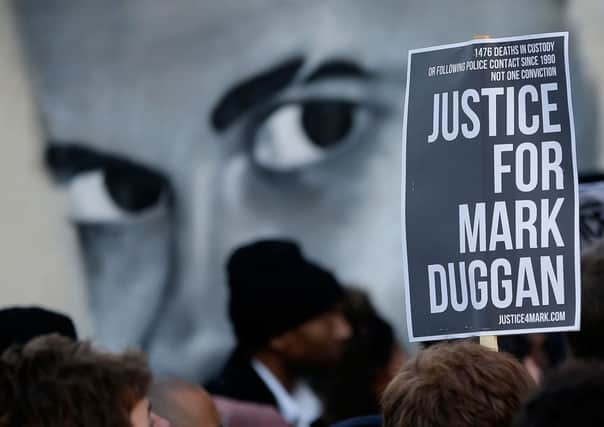Mark Duggan: Met failed to review tactics


The Independent Police Complaints Commission (IPCC) recommended the review in 2005 following the shooting of a suspected drug dealer, Azelle Rodney, saying it was a “high risk option” which carried risks to the public, suspects and officers.
Scotland Yard yesterday conceded it was wrong not to have conducted a review, but said an “interim review” had now been completed by the College of Policing.
Advertisement
Hide AdAdvertisement
Hide AdSpeaking to the BBC on the Panorama programme, which was due to be broadcast yesterday evening, the Met’s assistant commissioner, Mark Rowley, tried to defend the force’s failure to follow the recommendation.
He said: “Perhaps some formal paperwork and formal thinking should have been done at the time – it wasn’t, but we’re constantly looking at the tactic.
“If anyone has a better idea on how you confront armed criminals in vehicles with a view to arresting them safely and seizing their weapons then we’re up for better ideas. People say review, people don’t come forward with better ideas.”
The “hard stop” tactic is a pre-planned operation which involves armed officers deliberately intercepting a vehicle to confront suspects.
Duggan was shot by a Scotland Yard marksman after armed officers stopped the taxi in which he was travelling in Tottenham, north London in August 2011, sparking riots across England.
Police believed he planned to collect a gun from another man, Kevin Hutchinson-Foster, and then go on to Broadwater Farm, also in Tottenham.
An inquest jury early this month found he was lawfully killed by a police marksman despite being unarmed when he was shot.
Following the shooting of Mr Rodney in 2005 in another “hard stop” incident, an IPCC report made five significant operational recommendations to the Met, particularly to review the tactic.
Advertisement
Hide AdAdvertisement
Hide AdBut no significant changes had been made by the time of Duggan’s death in 2011, the BBC programme has claimed.
IPCC deputy chairwoman Deborah Glass said: “I think moral persuasion is an extremely powerful sanction and the questions will be asked… if we have to make a recommendation twice, then I think there is a legitimate question to be said –why don’t you make, give, effect this the first time round?”
She also said: “It is not for the IPCC to enforce recommendations.”
In a statement, the Met said: “It was wrong not to formally review the tactic in 2005 following the IPCC recommendation. This is a national tactic to which we subscribe.
“However, following the result of the Azelle Rodney inquiry, an interim review has been completed by the College of Policing and the MPS will now work with the college and the national lead, to see if there are any alternative or better tactics available in the rest of the world.”